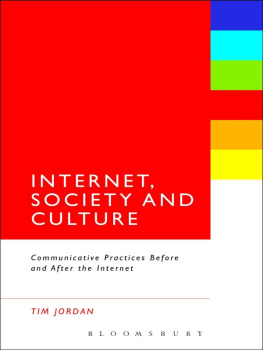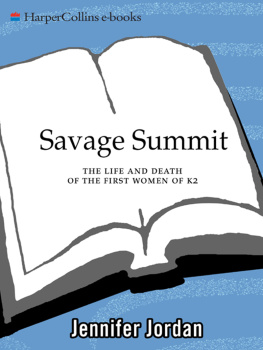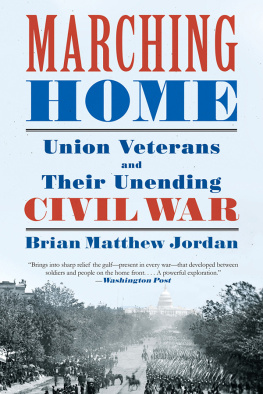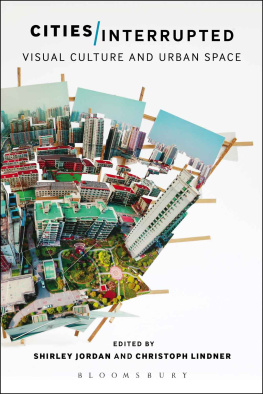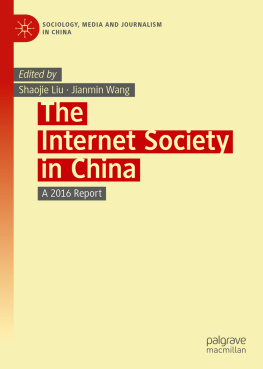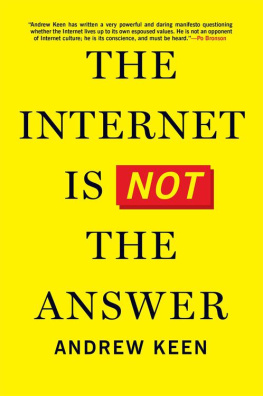Jordan - Internet, Society and Culture
Here you can read online Jordan - Internet, Society and Culture full text of the book (entire story) in english for free. Download pdf and epub, get meaning, cover and reviews about this ebook. year: 2012, publisher: Bloomsbury Publishing, genre: Religion. Description of the work, (preface) as well as reviews are available. Best literature library LitArk.com created for fans of good reading and offers a wide selection of genres:
Romance novel
Science fiction
Adventure
Detective
Science
History
Home and family
Prose
Art
Politics
Computer
Non-fiction
Religion
Business
Children
Humor
Choose a favorite category and find really read worthwhile books. Enjoy immersion in the world of imagination, feel the emotions of the characters or learn something new for yourself, make an fascinating discovery.
Internet, Society and Culture: summary, description and annotation
We offer to read an annotation, description, summary or preface (depends on what the author of the book "Internet, Society and Culture" wrote himself). If you haven't found the necessary information about the book — write in the comments, we will try to find it.
Jordan: author's other books
Who wrote Internet, Society and Culture? Find out the surname, the name of the author of the book and a list of all author's works by series.
Internet, Society and Culture — read online for free the complete book (whole text) full work
Below is the text of the book, divided by pages. System saving the place of the last page read, allows you to conveniently read the book "Internet, Society and Culture" online for free, without having to search again every time where you left off. Put a bookmark, and you can go to the page where you finished reading at any time.
Font size:
Interval:
Bookmark:

Internet, Society and Culture
Internet, Society and Culture
Communicative Practices Before and After the Internet
Tim Jordan

Contents
Id like to thank the following for making whatever their intended or unintended contribution was. Of course, the book (including all its faults) is my responsibility.
Katie Gallof has been a very helpful and interested editor. Two anonymous referees helped ensure I made clear the methodological choices underpinning this project.
Open University colleagues helped by listening as I started to sort out these ideas as the project began. In particular Richard Collins, who showed me Esther Milnes book Letters, Postcards, Emails (which nearly stopped me in my tracks when I thought it was the project I was embarking on), and Steve Pile who both helped intellectually and also in other important ways when my personal life was difficult. Jenny Robinson offered a place to stay when I was in-between houses which was both generous and deeply needed. Much of the writing up was done while on a sabbatical from the Open University which helped significantly to recover from being Head of Department. The Sociology Department at the Open University also supported this research with a small grant that enabled a pilot project into the research on letters.
Many thanks to Donna Haraway and the History of Consciousness Department at University of California at Santa Cruz who offered a very congenial and challenging home, and I apologize to them for not giving enough back. Between the trees of UCSCs campus and trips to watch Steamer Land and Mavericks, this was an environment that helped me to think-with.
The British Academy supported this research with a small grant without which the archival analysis of letters in Australia would not have been possible. The librarians in the State Library of Victoria were magnificent. The Mitchell Library in Sydney was also helpful. My friends and family in Australia offered a counterpoint to the long days immersed in the nineteenth century with twenty-first-century wine, food and company.
The research group Cultural Production in the Digital Age run by Tarleton Gillespie and Hector Postigo provided an important intellectual environment and the chance to talk through ideas with other better informed colleagues.
New colleagues at Kings College London in Culture, Media and Creative Industries and in Digital Humanities have provided a stimulating environment. Students on the Masters in Digital Culture and Society at Kings College London have also provided many digital natives whove corrected and expanded my knowledge.
My friends Nick, Rahman, Liam, Rodolphe and latecomer Joth have proven how virtual friends can become some of the best of friends. And to my guild AS which provides much amusement even when Anders tricked me into becoming guild leader again.
Finally, this goes to Matilda and Joanna with love.
Introduction
The nature of culture and society changed at the end of the twentieth century, as novel forms of communication dependent on internet technologies came into widespread use. With the internet came not just email, electronic discussion boards, social networking, the world wide web and online gaming but across these, and other similar socio-technical artefacts, also came different identities, bodies and types of messages that changed the nature of communication and culture. The following arguments explore interrelations between the rise of the internet and different identities, bodies and messages in communication and examine their effects on twenty-first-century cultures and societies. The focus is on the practices that make the sending and receiving of messages possible and how these practices have changed. This will be done by comparing a case study of pre-internet communication using early nineteenth-century letters with a case study of deeply immersive internet communication using online virtual world gaming. This will lead to consideration of the meaning of changes in communication brought by internet technologies for wider cultural and social change, particularly in the normalization of communicative anxiety.
Such a project explores the nature of communication after the rise to mass use of internet technologies. In this sense, being after the internet is not the same as being without the internet but instead refers to how communication operates once internet technologies are integrated into it. The first step of this project is to consider the claim that there has been social and cultural change related to internet technologies, and, to do this, it is useful to look at a puzzle about metaphors and analogies between the non-virtual world and virtual phenomena. Such metaphors are nearly always based on a familiar phenomenon from the non-virtual world (e.g. letters) that is then applied to an aspect of the virtual world (e.g. email) to explain or introduce the latter. The puzzle is that such metaphors often appear obviously and intuitively clear, allowing what seemed novel and puzzling to be understood as familiar and obvious, yet after some consideration such metaphors usually turn out to be significantly misleading. What at first seems to be an insight turns into a failed interpretation, and in doing so offers an indication of cultural and social changes that have come with mass use of the internet. To see this, we can look at two examples of the difficulty of comparing what seem, at first glance, to be the same acts conducted in the online and offline worlds; burglary and street protest.
Metaphors and their failures: the metaphor of burglary
Hacking, or to some cracking, refers to the act of breaking into someone elses computer remotely. As has often been said in computer security circles, the only way to be certain someone cannot access your computer illicitly is to lock it in a secure room that has no access to the internet and then allow no one else access to the room. Once a computer is connected in some way that allows other computers to access it then the chance that someone can break into that computer is always there, whether it is secured by password or firewall or these and all manner of other computer locks.
The history of cracking offers many varied and increasingly complex ways of breaking into a computer (Goldstein, 2008). These range from the cracker who gained access to the Duke of Edinburghs email account by guessing that the password would be 1234, to the production of a program that automated breaking into accounts on Microsoft networks, to the playful types who break into websites and rename them (the Central Intelligence Agency renamed to the Central Stupidity Agency, for example) (Taylor, 1999, p. 72; Jordan and Taylor, 2004, pp. 11114). From the beginning of cracking, it seemed that an obvious metaphor for it was burglary. The success and failure of this metaphor can be examined drawing on a formative time in the history of hacking and the internet; the 1990s period of cracking, which is now sometimes called its golden age, before the more criminal and geopolitical phase of the early twenty-first century (Sterling, 1994; Menn, 2010; Poulsen, 2011).
Burglary makes sense as a metaphor for cracking because it captures its key characteristics. There is the sense of the illicit and the need to break something to pass a boundary, and it further captures the sense of an invasion of space by someone not meant to be there who is gaining some advantage. Most important of all, burglary is well known and easily understood and can thus make the strange into something commonplace. The burglary metaphor was popularized primarily by computer security professionals, who were often desperate to explain to the internet-illiterate in the 1990s what cracking meant. It was therefore an advantage that burglary not only explained what cracking meant but also rang the alarm bells that many felt were necessary. For all these reasons, burglary became during the 1990s, and remains, an oft-used metaphor for cracking. However, when more closely examined, the metaphor begins to appear confusing and, under sustained analysis, misleading. Examining this makes clear that the burglary metaphor for cracking does not work as an accurate representation of cracking but instead its inaccuracy functions to establish moral judgements about cracking.
Font size:
Interval:
Bookmark:
Similar books «Internet, Society and Culture»
Look at similar books to Internet, Society and Culture. We have selected literature similar in name and meaning in the hope of providing readers with more options to find new, interesting, not yet read works.
Discussion, reviews of the book Internet, Society and Culture and just readers' own opinions. Leave your comments, write what you think about the work, its meaning or the main characters. Specify what exactly you liked and what you didn't like, and why you think so.

